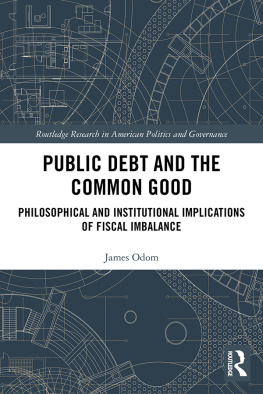Odom - Public debt and the common good : philosophical and institutional implications of fiscal imbalance
Here you can read online Odom - Public debt and the common good : philosophical and institutional implications of fiscal imbalance full text of the book (entire story) in english for free. Download pdf and epub, get meaning, cover and reviews about this ebook. City: United States., year: 2019, publisher: Routledge, genre: Politics. Description of the work, (preface) as well as reviews are available. Best literature library LitArk.com created for fans of good reading and offers a wide selection of genres:
Romance novel
Science fiction
Adventure
Detective
Science
History
Home and family
Prose
Art
Politics
Computer
Non-fiction
Religion
Business
Children
Humor
Choose a favorite category and find really read worthwhile books. Enjoy immersion in the world of imagination, feel the emotions of the characters or learn something new for yourself, make an fascinating discovery.
Public debt and the common good : philosophical and institutional implications of fiscal imbalance: summary, description and annotation
We offer to read an annotation, description, summary or preface (depends on what the author of the book "Public debt and the common good : philosophical and institutional implications of fiscal imbalance" wrote himself). If you haven't found the necessary information about the book — write in the comments, we will try to find it.
Odom: author's other books
Who wrote Public debt and the common good : philosophical and institutional implications of fiscal imbalance? Find out the surname, the name of the author of the book and a list of all author's works by series.
Public debt and the common good : philosophical and institutional implications of fiscal imbalance — read online for free the complete book (whole text) full work
Below is the text of the book, divided by pages. System saving the place of the last page read, allows you to conveniently read the book "Public debt and the common good : philosophical and institutional implications of fiscal imbalance" online for free, without having to search again every time where you left off. Put a bookmark, and you can go to the page where you finished reading at any time.
Font size:
Interval:
Bookmark:

The American national debt stands at $20.49 trillion as of January 2018, or roughly $63,000 for every person in the United States. The national debt has grown six-fold in the past 25 years, and borrowing only has accelerated in recent administrations. What are the factors driving such unrestrained borrowing? Is American fiscal policy different now than in an earlier era? Is there a moral dimension to public debt and, if so, how can that dimension be measured?
Public Debt and the Common Good addresses these and other questions by looking to the fiscal policy of the American states. Drawing on classical themes and the longest quantitative review of state debt in the literature, James Odom expertly integrates institutional analysis with dimensions of culture to define the parameters of political freedom in a theoretically coherent way. In doing so, Odom argues that centralization and injustice, or the incapacity for the common good, can help explain state indebtedness.
Contributing to ongoing scholarly debates on public debt theory, this book will be of interest to students, scholars, and practitioners who work at the intersection of political philosophy and economics, as well as those who specialize in state public policy, state politics, and federalism more generally.
James Odom is Senior Policy Advisor to Texas State Senator Bryan Hughes. A recent Baylor University graduate, Odom has served as Director of Public Affairs at the same institution as well as a policy analyst with then-Sen. John Ashcroft of Missouri. In 2000, Odom was a candidate for the U.S. Congress from Oklahomas fourth district.
14 The Latino Gender Gap in U.S. Politics
Christina E. Bejarano
15 Perspectives on Presidential Leadership
An International View of the White House
Edited by Michael Patrick Cullinane and Clare Frances Elliott
16 Super PAC!
Money, Elections, and Voters after Citizens United
Conor M. Dowling and Michael G. Miller
17 White Voters in 21st Century America
George Hawley
18 Candidate Character Traits in Presidential Elections
David B. Holian and Charles L. Prysby
19 The Social Process of Lobbying
Cooperation or Collusion?
John C. Scott
20 Congressional Communication in the Digital Age
Jocelyn Evans and Jessica Hayden
21 Reforming the Presidential Nominating Process
Front-Loadings Consequences and the National Primary Solution
Lisa K. Parshall
22 Public Debt and the Common Good
Philosophical and Institutional Implications of Fiscal Imbalance
James Odom
23 Removal of the Property Qualification For Voting in the United States
Strategy and Suffrage
Justin Moeller and Ronald F. King
Philosophical and Institutional Implications of Fiscal Imbalance
James Odom

First published 2019
by Routledge
711 Third Avenue, New York, NY 10017
and by Routledge
2 Park Square, Milton Park, Abingdon, Oxon, OX14 4RN
Routledge is an imprint of the Taylor & Francis Group, an informa business
2019 Taylor & Francis
The right of James Odom to be identified as author of this work has been asserted by him in accordance with sections 77 and 78 of the Copyright, Designs and Patents Act 1988.
All rights reserved. No part of this book may be reprinted or reproduced or utilized in any form or by any electronic, mechanical, or other means, now known or hereafter invented, including photocopying and recording, or in any information storage or retrieval system, without permission in writing from the publishers.
Trademark notice: Product or corporate names may be trademarks or registered trademarks, and are used only for identification and explanation without intent to infringe.
Library of Congress Cataloging-in-Publication Data
A catalog record for this title has been requested
ISBN: 978-1-138-61816-9 (hbk)
ISBN: 978-0-429-46133-0 (ebk)
Typeset in Times New Roman
by Wearset Ltd, Boldon, Tyne and Wear
For the Lord Jesus Christ. None of his good promises have failed.
And for Wendy and Isaac.
Credit is morality, and the exact measure of the soundness of the social state.
Junius Tracts, 1844
Money is imbued with moral meaning because, as the saying goes, money is condensed life. Money is food, shelter, clothing, and the means to other material goods that fill a human life beyond subsistence. As Michael Sandel has provided an important, recent reminder of ancient teaching, money cannot place a value on all things and can itself obscure a view of what is truly important. Still, money is the means by which physical life is sustained and for that reason is of great significance.
If morality pertains to the proper manner of living, then credit does indeed have a moral dimension. When credit is taken, the means of living of one person are entrusted to another, and a pledge to return those means, usually with compensation in the form of interest, is received in turn. Not to honor the commitment to repay is to take the sustenance for life away. Hence, the debtors reliability is revealed by his handling of the money entrusted, and his character is estimated by his creditworthiness.
Notions of reliability, faithfulness, and character may come to mind more quickly when assessing an individual borrower, particularly if one is the lender and relying on that borrower to repay. These concepts extend beyond interpersonal credit arrangements, however, to the fiscal behavior of nations. National currencies are issued and sustained with the full faith and credit of those governments. Societies have a national character, all that goes under the general and often nebulous word culture. Furthermore, how nations handle their public accounts pertains to their national character. In The Crisis of the Tax State, Schumpeter writes:
The spirit of a people, its cultural level, its social structure, the deeds its policy may prepareall this and more is written in its fiscal history, stripped of all phrases. He who knows how to listen to its message here discerns the thunder of world history more clearly than anywhere else.
As with the individual, the handling of money by national governments reveals what truly animates that polity, its priorities and objectives, and, it will be argued, its moral character, or capacity for justice.
The American national debt stands at $20.49 trillion as of January 2018, or roughly $63,000 for every person in the United States. A fiscal challenge of this magnitude has been most of a century in the making, under Republican and Democratic administrations and congresses. Norms of budget balance shared broadly by both parties came to be replaced by norms of deficit financing. For most of the postwar era, Democrats consistently have pushed for the expansion of social programs, and Republicans have favored tax cuts without commensurate spending reductions. The net result of both these enduring party objectives has been the sustained and, more recently, rapidly accelerating growth of the national debt under the Bush, Obama, and Trump administrations.
Font size:
Interval:
Bookmark:
Similar books «Public debt and the common good : philosophical and institutional implications of fiscal imbalance»
Look at similar books to Public debt and the common good : philosophical and institutional implications of fiscal imbalance. We have selected literature similar in name and meaning in the hope of providing readers with more options to find new, interesting, not yet read works.
Discussion, reviews of the book Public debt and the common good : philosophical and institutional implications of fiscal imbalance and just readers' own opinions. Leave your comments, write what you think about the work, its meaning or the main characters. Specify what exactly you liked and what you didn't like, and why you think so.










